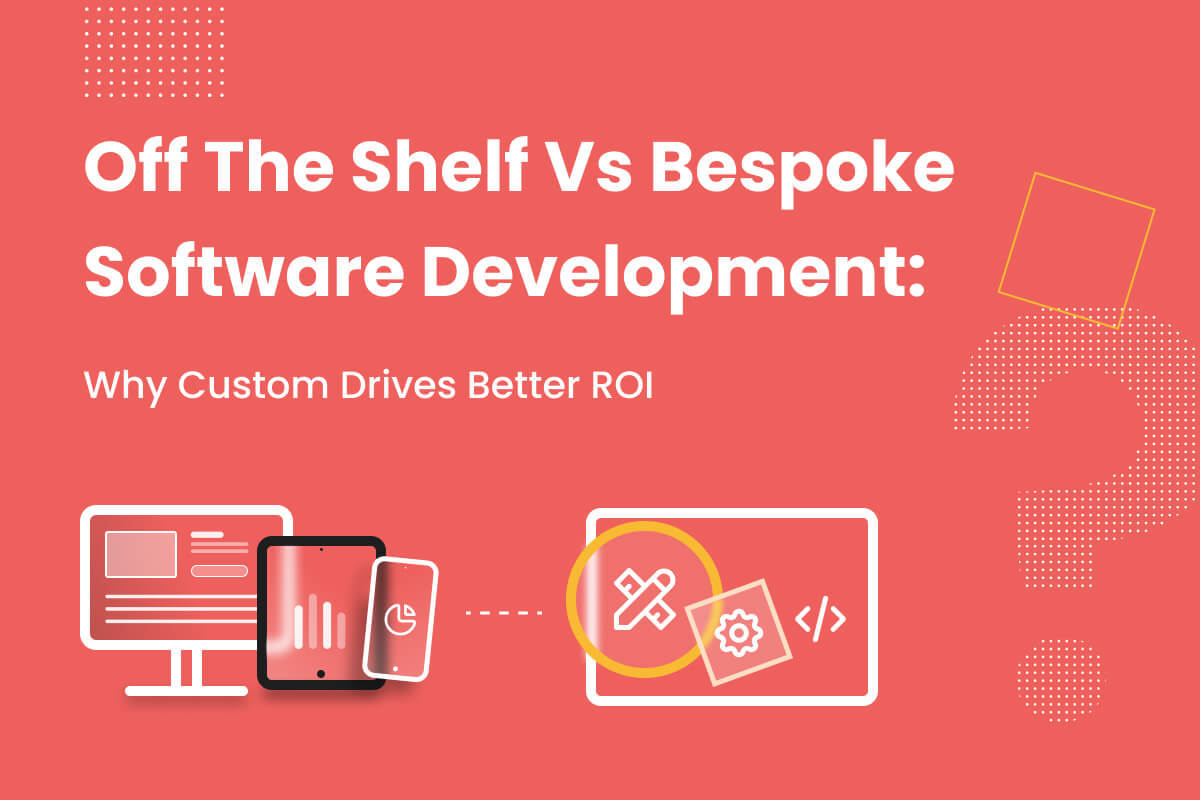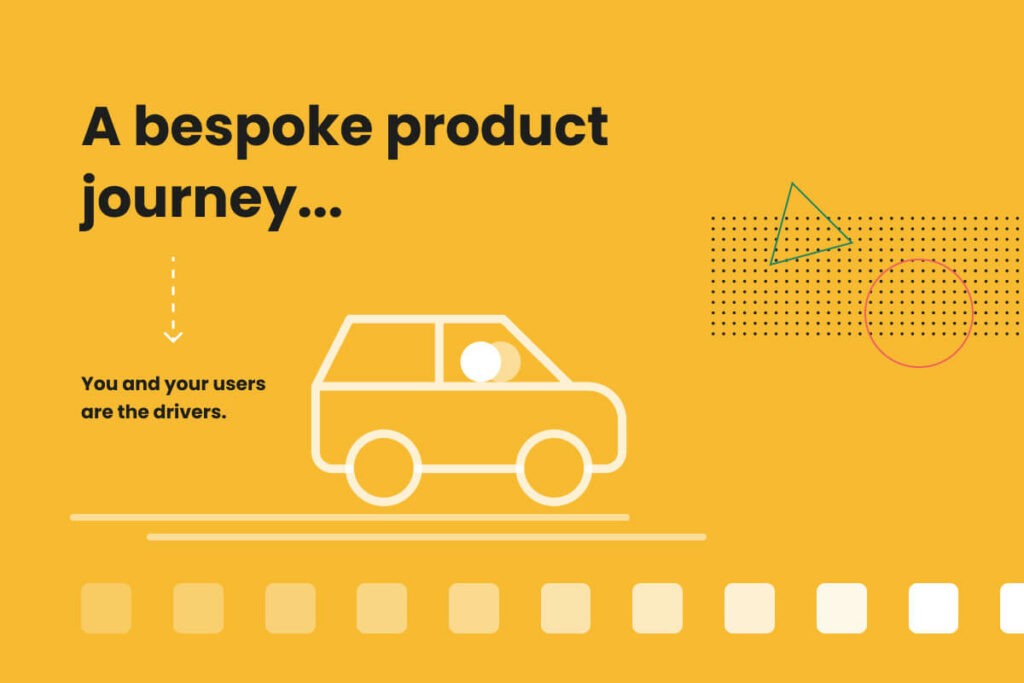Off the Shelf vs Bespoke Software Development: Why Custom Drives Better ROI

When it comes to your business, choosing the right software or app technology to support your users or team generally means either choosing between an existing product off-the-shelf product or commissioning a bespoke software product.
You might be surprised to learn that despite the fact that KOMODO is a digital product studio specialising in custom software and apps, we don’t always recommend custom. But why is that? Why would a software developer ‘cheat’ themselves out of work by telling you to choose an existing product? Let’s take a deep dive into the arguments around 'Off the Shelf vs Bespoke Software' to help you understand the full context of this decision and why custom goes way beyond product development…
Off-the-shelf: why even the best software developers may turn you down

In the world of software, there’s no lack of choice. Whatever you need for your business, there’s likely some basic version that can accomplish some level of what you need. Whether that’s a CRM system for tracking leads or an inventory management tool for eCommerce platforms, there are plenty of ‘off the shelf’ products available. These products, however, come with their own level of complexity. Where many people assume that they’ll be more straightforward, you still have to factor in the time it takes to integrate these systems and make them fit your requirements. Even when the solution comes from an enormous provider such as Microsoft, there’s work to be done to fit it into your business. Off-the-shelf solutions are more affordable, however, which is one of the key reasons they are chosen over a bespoke option. Even those that carry complex tiered pricing based on your organisation’s technology set-up and team size will generally work out more cost-efficient at first. If you have broad needs that fit the offering of an off the shelf product, it may be worth choosing one. However, there are some considerations to bear in mind that go beyond pricing and integration challenges. The main issue is that you have no control over the roadmap of the product and no say in how it changes or adapts. If, for example, your organisation’s hardware changes, there’s no guarantee the product will continue to work as expected. If issues occur, you’ll have to submit a ticket and wait for the fix - or in some cases, you may potentially never see a resolution.
Pros
Cons
Ready-to-use and available quickly. Can require significant time and investment to integrate with your team. Purpose-led expertise - the development team behind off the shelf products knows their target market inside and out. The software is business-agnostic. It may be a specialist ERP tool, but it is not built for your unique organisation, hardware and team ability. Visible customer reviews and a public presence to help reassure you when deciding. No specific knowledge of your needs and sector - can only ever retrofit/adapt to your needs through your customer support contact. Predictable costs based on visible pricing structures and payment models. Costs may scale significantly depending on requirements and you have no ownership of the product. Can generally request features and fixes at a certain spend level. Often prone to feature bloat and there’s no certainty of updates or ongoing support.
Bespoke software: ROI gets real

What is bespoke software & what are its advantages and disadvantages? When you weigh up the cost between bespoke and off-the-shelf products, the majority of business owners or team leaders will see the more affordable off-the-shelf pricing structures as a huge bonus. It’s certainly true that in most cases, the actual cost of software is far cheaper when it’s not a bespoke product. Bespoke products are only usually specified as a result of unique needs. Why would a team leader, for example, try to use an off-the-shelf product if they needed a specific app that accomplished something their customers needed? However - consider that off-the-shelf products often come with a wide range of functionalities and features, some of which you never actually need, and the decision becomes more complicated. Why pay for a subscription service for a product that you only need one element of? Cost and cost-efficiency are not the same. While the original price of an off-the-shelf solution may look enticing, the real costs to your business can be wildly different. If, for example, it takes a long time to integrate with your existing tools, you lose time and money. If you need to spend weeks waiting for a specific update you’ve requested, you’re losing yet more money. But there’s an even larger cost element at play…
Bespoke products are a process

With a bespoke product, you’ll be entering a product development journey that by its very nature will help your business grow. If you work with a product design studio like KOMODO, you’ll engage in cutting-edge user research and UX design. Your product is expected to meet specific user requirements, so undergoing a dedicated user research process, UX design approach and instilling design thinking in your business should all be a part of the bespoke journey. Exposure to design-thinking and UX principles is invaluable to your business - even before the product goes live. The ROI of UX design can be as high as 9,900% and every $1 shows that ‘Design-centric’ companies outperformed the S&P 500 by 211%. At IBM, design thinking led to a more efficient workflow that increased ROI by 300%. In addition to the UX and design elements, you’ll also benefit from the iterative nature of a bespoke product journey. That means that you can launch a ‘minimum viable product’ to get your product underway and in front of your users, then begin to update and expand on it through dedicated feedback and user data. In an off-the-shelf system, you’re simply ‘along for the ride’ whereas, with bespoke, you and your users are the drivers.
Pros
Cons
Experience each stage of the product development cycle as a learning curve - showcasing user research, UX design and Agile principles to help grow your business as well as launch the product. Can take weeks or months to develop a product from scratch and will be more costly. Each product feature will be built based on user requirements rather than speculation. Requires a user research process that can be costly in time and money, Product is owned by your business and fully controlled by your own decisions. Can update and iterate when required without licensing or fee limitations. If working with an agency partner, added features and updates may add to the costs. Generate greater ROI by using a product that is built around your business, your users and your needs instead of adapted to fit them. You need to take time to understand the bespoke process and actively contribute to it to maximise your business’ ROI. Ultimately, the benefits of bespoke software are hard to ignore. Business owners often feel they afford/don’t need bespoke software solutions as they’re either overly complex or you feel your needs can be met with a standard solution. But after factoring in full ownership of your new product, control over the update cycle, ROI benefits from user research and long-term security and visibility, it’s a clear win for bespoke...in most cases. If you’ve got a product requirement, why not contact us and see whether we think the benefits of going custom are worth it for your business. If we don’t, we’ll signpost you to the right off-the-shelf product - removing some of the hassles for you. Here at KOMODO, we work with clients every day to understand their user requirements. We build ROI-boosting product solutions that appeal not only to your users but also convey wider benefits to your entire team. Contact us now to set up a short, structured call to discuss your options.

Sign up to our newsletter
Be the first to hear about our events, industry insights and what’s going on at Komodo. We promise we’ll respect your inbox and only send you stuff we’d actually read ourselves.







